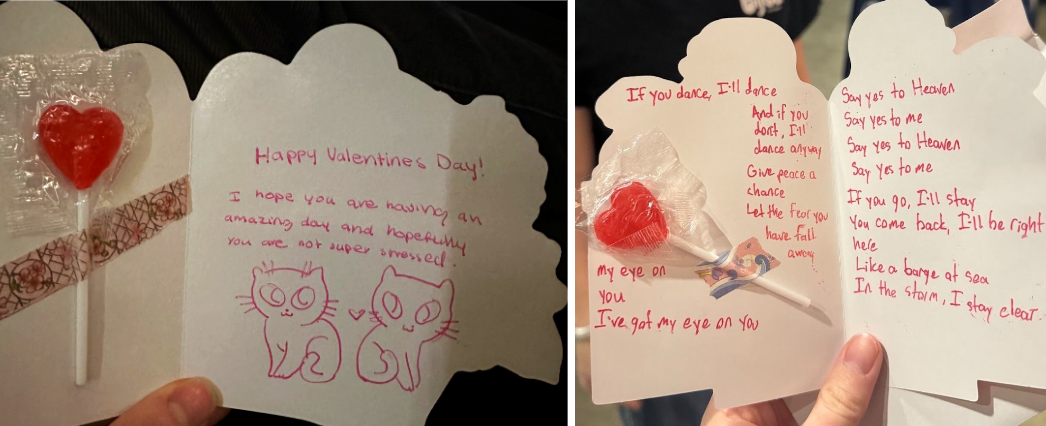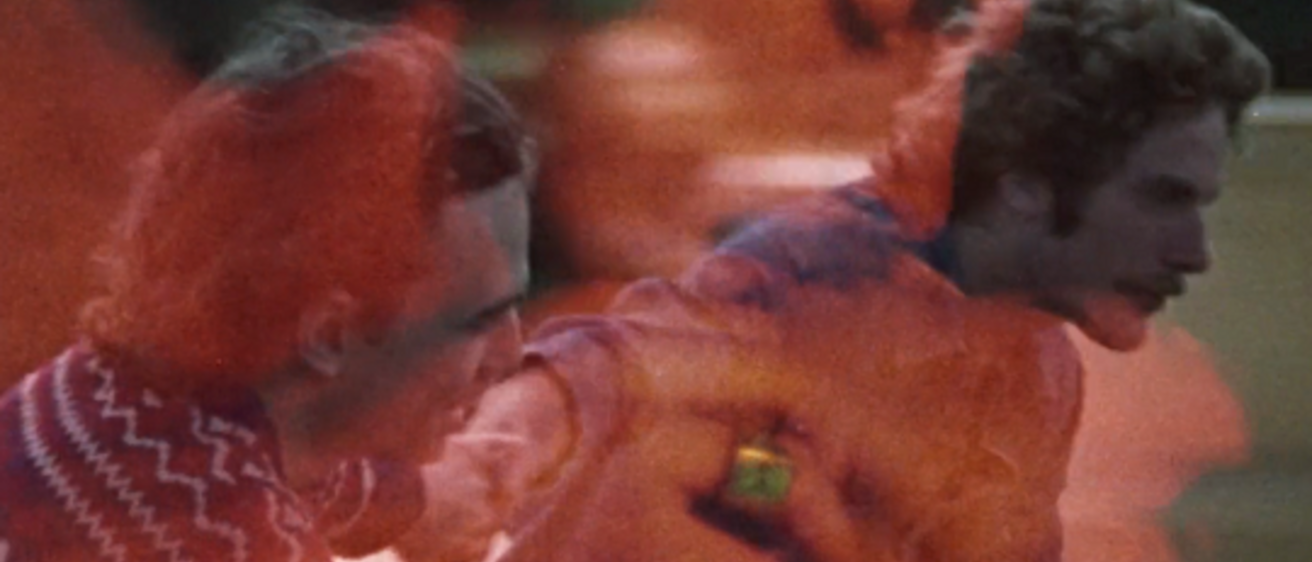By Sam Bowden, Cinematic Arts Graduate Student & Guest Writer
“Love is complicated,” read the promotional poster for Bijou’s Valentine’s Day screening of Spike Jonze’s Her (2013). A truism that invades people’s minds more prominently around Cupid’s divisive holiday, cinema lovers especially use the yearly occasion to explore different forms of love on screen. Some torture themselves by revisiting fraught love stories like Eternal Sunshine of the Spotless Mind. Others indulge in comfort rewatches of saccharine Hugh Grant rom-coms. Others, cinephiles or otherwise, might forgo the romanticism of the holiday and cut straight to the source: getting a private room and watching internet porn.
This taboo subject, that we watch pornography, was raised by visiting scholar and archivist Dan Erdman for Bijou’s annual XXX screening of Passing Strangers (1974) on February 9th. Recently given a 2k physical release by boutique distributor Altered Innocence, Passing Strangers was San Francisco filmmaker Arthur J. Bressan’s first narrative feature. Produced on the margins of the hardcore scene, the film includes plenty of unstimulated sex. As crowds convened in FilmScene’s Theater 2 to watch the film, Erdman’s pre-show introduction pointed out the historical context of pornography exhibition in the ‘70s versus today. He invited the audience to imagine ourselves not as a 2024 audience, but one that was accustomed to viewing films like these. He humorously noted that what we were about to view might look and feel strange compared to what many of us would go on to watch later on our phones.
Bijou’s 2024 Valentine’s Day selections reflected the organization’s finesse at programming content that’s sometimes underseen and cutting edge, at other times familiar favorites. On Friday, Bijou brought the relatively unknown porn feature to Iowa City, followed by the Joaquin Phoenix led sci-fi rom com on Saturday the 10th. Passing Strangers’s artistry shined, leaving many of us wondering why the film remains obscure and undervalued. Not an intentional double feature, the following night would bring in a very different, mainstream film that happens to center loneliness and awkward sex scenes: Her. I assume many in the audience already had a relationship history with the movie, like I do (I’ve seen and recommended the film countless times). The film’s imaginations of A.I. and interest in the electronic eros still seem prescient over a decade later.
Over the two nights of Valentine’s day celebrations at the Chauncey, moviegoers got a taste for something new, as well as some comfort food. Many couples broke up, fought, got back together, new friendships were formed, sexual awakenings were had, etc. I’m exaggerating– though it’s entirely possible. Both films, Her and Passing Strangers, provoked lively discussion afterward. The weekend’s events seemed to not only satisfy audiences’ taste for romance (and plenty more), but called into question what kind of love stories deserve to be screened, what the right way to behave in the cinema is, and what 50 years difference has signaled for sex and the cinema.
Passing Strangers (1974) dir. Arthur J. Bressan, Jr.
Bijou celebrated Passing Strangers’ 50th anniversary By bringing the under-seen but critically acclaimed film to Iowa City on Friday, February 9th. If you haven't heard of the film, fear not– most outside of porn studies scholars and niche cinephiles likely haven’t either. This is partly why Bijou's selection enticed moviegoers, suiting Bijou’s vision of showing underseen gems. Also, let us not forget, the Bijou Film Board shares its name with one of the most preeminent adult film locales in history, Chicago’s Bijou Theater. The 9:00 P.M. X-rated screening nearly packed the house.
As previously mentioned, Dan Erdman made the trek from Chicago to introduce the film. Erdman is an archivist at Media Burn Archive and authored the 2021 book Let’s Go Stag! A History of Pornographic Film from the Invention of Cinema to 1970. Although notably Passing Strangers falls a few years outside of the purview of Erdman’s book and isn’t a stag film (an underground, Code-evading, usually short film which mostly died out by the ‘60s), his expertise helped contextualize the film for viewers. Erdman’s introduction was rather informative and provocative while also being accessible. He gave a lovely overview of Bressan Jr.’s career and explained features of hardcore cinema to an audience that was largely young, many who have probably never seen pornography in public before. Focusing especially on the elements of production, exhibition, and reception, Erdman contrasted the cinematic experience of the 1970s to today. Nodding at our current cultural landscape where the existence of sex scenes in popular media is under public and critical scrutiny, he invited the audience to time travel to a time where the adult film industry was booming. With that challenge in mind, the audience was primed to watch some smut.
What we would come to watch, however, surprised many. Passing Strangers turned out to be erotica, yes, but also a surprisingly wholesome romance and document of Gay Liberation all at once. The film follows two men, one teenaged and inexperienced, one older and disillusioned, who connect through an anonymous newspaper ad. At first, the trappings of its low budget are apparent: asynchronous dialogue and voiceover were all over the place. But once the rhythm was established, I imagine most of us in the audience got accustomed to its otherwise excellent artistry. The black and white cinematography was inspired, even in sex scenes, privileging different artful ways of showing bodies. One particularly compelling scene shows the teenager (Robert) at an adult film store booth, with repeated shots of his eyes as he watches the explicit material. The sequence highlights voyeurism in a way not typical of pornography. From close-ups of body parts to wide shots of men having sex with the backdrop of the San Francisco Bay, the film proved a real aesthetic marvel.
About halfway through, mirroring the younger man’s sexual awakening, the film transitions from B&W to full color. The abrupt shifts inspired audible audience gasps. Naturally, there was a heightened sense of awareness of what other audience members were doing during the screening. I noticed frequent laughs from a group behind me, maybe too often or at inappropriate parts. But the response wasn’t entirely unwelcome or unexpected; the sex on screen often felt awkward, messy, and real, and having an audience that was entirely silent and serious the whole time would have also felt inappropriate. One monologue about hating gym class in high school and feeling “skinny and weird” made me burst out laughing, but only from being too relatable and real. Other times, awareness of being in an audience was inevitable as the graphic content escalated. Do I act like this isn’t hot? Are others watching my reactions?

Afterward, the audience’s main reaction seemed to be surprise, not at the graphic sex but at the film’s wholesome narrative arc. The story of a gay teen being taken under the wing of a more experienced– yet good-intentioned and harmless– man seemed too good to be true. Then, about the last 10 minutes of the film, we see our protagonists at a protest for Gay Liberation. The mode seems to switch suddenly to documentary filmmaking. The images are rather moving. The choice to end the film this way reflects Bressan Jr.’s uninhibited politics, even in X-rated film. It fulfilled the narrative of our young protagonist needing not just sex but community, and sex being political by nature.
Even as a grad student in film who gravitates toward sex and sexuality in my own research, Passing Strangers was a unique treat. I think everyone had a similar feeling. Whether it was the first time filmgoers had seen unsimulated content on a big screen, or the first time they had seen such a happy ending (pun intended) in a porno, surprise and delight were in the air.
Her (2013) dir. Spike Jonze
Following Friday night’s X-rated screening, Saturday night brought the R-rated Her. Not a pornographic film, it provoked audiences in different ways in another near-sold out screening at FilmScene. This was probably my fifth or sixth time watching the film, an experience I assume rang true for a lot of the audience in attendance. However, I had never seen the film in a theatrical setting. Seeing it in the proper cinematic way affirmed my love for the story while reminding me of its unique commentary on sex and romance in the 21st century.
When I first saw the film at 15, it was perhaps my first introduction to artificial intelligence on screen, and one of my first love affairs with cinema. I would go on to buy the theatrical poster of the handsome Phoenix as Theodore Twombley (speaking of sexual awakenings), a staple of my college dorm room decor. The film has accrued a reputation over the last decade as essential viewing for lonely romantics.
The Bijou After Hours screening included its usual fanfare with special handmade Valentine’s cards, perfectly suited for a film about a greeting card writer. The Valentine I received included much needed encouragement during a busy semester. I couldn’t help contain my jealousy at others’ Valentines, which ranged from horror movie themes to Lana Del Rey lyrics:

There’s little I can say about Her that hasn’t been said before as a beloved hit for the online film community. But ten years after its release, the film endures as a unique filmmaking vision. Many of its famous lines stick out rewatch after rewatch: “Sometimes I think I’ve felt everything I’m going to feel. And from here on out, I’m never going to feel anything new.” Despite its melancholy tendencies, the film’s lighter moments still provided plenty of laughter in the theater. Theodore’s potty mouth alien video game friend (voiced by the director) is still funny as ever. His phone chat with the “dead cat” fetish woman (voiced by Kristen Wiig) likewise holds up. Cutting through the comedic moments is a timeless romance at the center. Scarlet Johansson’s voice performance shines above all, bringing humanity and complexity to the artificially intelligent lover.
While the film’s near future vision was still prescient, ten years later some of its predictions concerning A.I. seemed at odds with our current landscape. First of all, Theodore’s career stuck out to me as especially lucky. There are current fears of A.I. replacing writers and other creative jobs. Jonze may have been optimistic in 2013, as many still are today, that greedy executives won’t use technology to cut corners and undervalue artists’ work. It’s a welcome, rose-colored vision of the near future that a gift for beautiful, romantic prose might still be valued. Another, related observation is the idealist vision that our tech will soon be as clever and artistic as Johansson’s Samantha. Anybody who has seen A.I. art can attest to its bad taste. That’s why my favorite part of the film stuck out again this viewing. During a wilderness retreat, Samantha writes and sings a gorgeous song in real time, called the “Moon Song.”
Scarlett Johansson & Joaquin Phoenix - The Moon Song (Her - OST)
Though my skepticism of the film’s imaginations of A.I. were apparent this viewing, I doubt the rest of the audience was as pessimistic. Otherwise, the film’s commentary on sex and sexuality seemed to relate and tug at the audience’s heart strings. As our modern relationships tend to become increasingly intertwined with technology, we can’t help but be enraptured by the film’s lonely protagonist.
It was a Valentine’s Day weekend to remember with the Bijou Film Board. Like myself, many audience members came out to see this inspired romantic double feature. These were different depictions of loneliness: a closeted teen finding sexual awakening and community in 1970s San Francisco and a lonely writer exploring a worldview-altering romance with A.I. Both films enraptured audiences and stimulated (intellectually and physically) in similar ways. They reminded us of cinema’s varied forms of depicting love and sex.
I can’t speak for everyone, but seeing Her’s Theodore spin around on the beach or Passing Strangers’ stunning shift to color made me think of cinema’s capability to help me see the world anew. Two nights of clever programming helped me discover a new favorite and renewed my affair with an old love. Seeing them with an eager live audience was the most exciting aspect. Avoiding warnings not to watch romance films during an annual, lonely time, filmgoers found comfort in a well-established student film culture with a taste for distinctive, cinematic treats.
